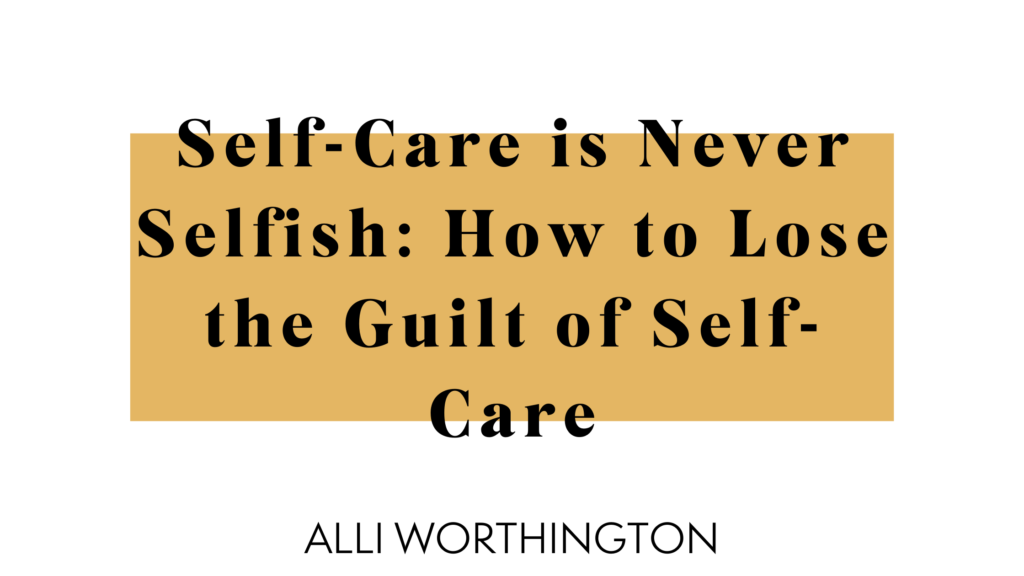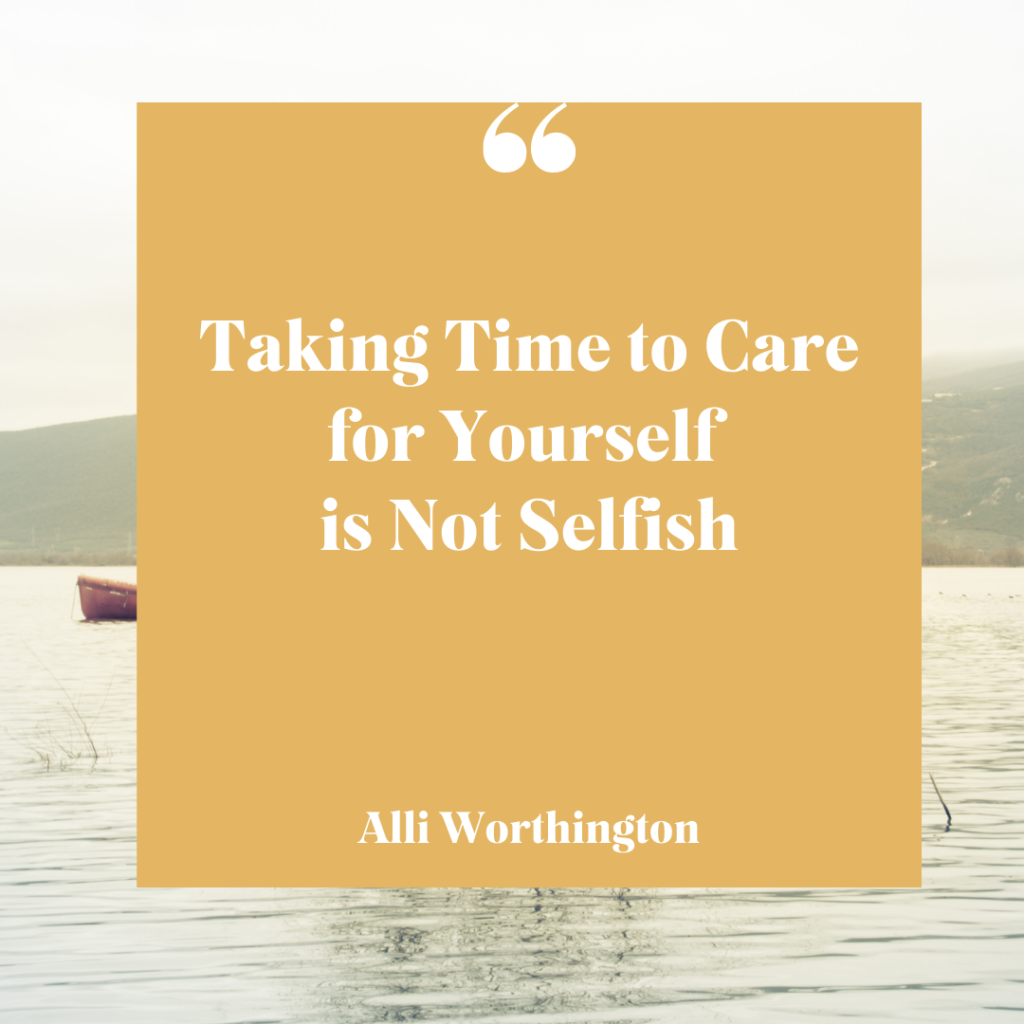You know building your brand is a crucial step to crafting your dream business. This workbook is designed with you in mind to simplify those steps.
Internship Application
Self-Care Is Never Selfish: How to Lose the Guilt of Self-Care

Have you ever felt guilty for making time for self-care? Perhaps you feel selfish about taking time for yourself. Or felt that it was a waste of time. Or maybe you just don’t have the time to fit one more thing into your already busy schedule. In this article, I will discuss how to eliminate guilt.
The truth is, most of us are too busy to take time out for self-care, and we neglect ourselves at a great cost to our well-being. We sacrifice sleep, health, exercise, hobbies, recreation, relationships, and other items essential to our well-being on the altar of busyness.
It’s easy to come up with all the excuses as to why we can’t make time for self-care even though it’s probably the most important thing we can do for ourselves. Taking time to care for ourselves is not selfish. It is needed for us to give the best of ourselves in whatever we’re doing.
You’ve probably heard a famous quote: “You can’t please anyone, including yourself when you’re too busy.” That is a true statement. Neglecting self-care is a warning sign that we’re over capacity and need to slow down to rest and care for ourselves.
Here are a few things you can start doing to care for yourself:
- Practice mindfulness and meditation
- Journaling
- Spending more time in nature
- Create boundaries to protect your energy
- Invest in your personal development
- Make time for joy, fun, and relaxation
- Exercise regularly
Self-care doesn’t negate being productive.
On the contrary, self-care makes us more productive and effective when we’re physically, mentally, and emotionally healthy. Are you convinced yet? Self-care should be a priority if we want to be happy and be our best. It’s just that simple.
So how do you overcome self-care guilt? Let’s talk about it.

Self-care helps you recognize your worth.
Sometimes it is much easier to help others recognize their self-worth than to consider your own. That has to stop, though. You deserve every single relaxing night in, spa trip, and bubble bath.
The time spent on the inner work-whether that’s reading personal development books, working with a life coach or therapist, or journaling all of your thoughts is well worth it. Give yourself permission to go after your desires, your wants, and your needs.
Believe me, your sense of self-worth shows up in your relationships and how you interact with others. That being said, if you find yourself questioning what you really believe about yourself, I’d like to ask you to keep a log of your internal thoughts and conversations.
You may be surprised to find that you’re unnecessarily hard on yourself. Remember, your sense of self-worth is not dependent on any circumstance or situation.
You are still worthy of love, joy, and peace in the middle of a hard day, a breakup, and a meeting that you may have handled poorly.
Just to name a few, your sense of self-worth is not contingent upon:
- How many Instagram or TikTok followers you have;
- How much money your business is bringing in;
- Or how attractive you are in comparison to others.
In order to begin experiencing a healthy sense of self-worth,
- Ensure the story you’re sharing about your life is staunched in gratitude and appreciation.
- Be honest with yourself and take responsibility when necessary;
- And practice your power pose and walk with your head held high.

Self Care helps you connect to something greater than yourself.
When you practice self-care, you permit other women to do the same. So often, women feel like it’s our duty to care for others. We put other people’s needs before our own.
I’ve been there! There are too many women out there neglecting their own happiness and well-being for the sake of other people.
This needs to change; you can be part of the change by showing up for yourself first! When you show up to love yourself, you give other women permission to show up to love themselves.
Some examples you can begin to adopt today to love yourself more completely are:
- Stop comparing yourself with others;
- Make time for little things;
- Cry when you need to;
- Forgive yourself;
- Take naps;
- Cut out the junk food;
- And actively practice your faith.
When you incorporate ways to love yourself, you’ll remember that you are connected to so much more than what you may see right in front of you.
You’ll remember that change and growth aren’t always linear. The mistakes you’ve made in your past contribute to how you walk in love with others today.
Remember, to show love, you have to be willing to receive it. What better way than to start with yourself?
SIGN UP TODAY FOR YOUR FREE WEEKLY ACTION STEP. 52 Weeks of Happy

Self-care reminds you boundaries are beautiful. Bitterness isn’t.
Establishing appropriate boundaries is one of the best ways to practice self-care. It’s a gift you give yourself and others, and it is necessary.
Boundaries help you to identify how you’re both unique and different from others. Without them, you begin to accept responsibility for other people’s issues and concerns.
When you accept responsibility for other peoples’ problems, you remove the onus of the obligation from them. Without feeling the weight of the issue themselves, those who you have stepped in for, also fail to learn how to problem solve and develop resilience.
They can even learn to develop codependent behaviors that can leave you feeling bitter.
People who struggle with bitterness often
- Develop feelings of entitlement;
- Begin to feel dissatisfied;
- Criticize themselves and others;
- Feel jealous;
- And hold grudges.
To make matters worse, people who harbor bitterness also blame others for their lack of enjoyment or progress in life. However, you are the only one to blame for your lack of boundaries. Let’s not be that person.
Self-care will not only lead you to love who you are, imperfections and all, but it will also help you to require that others also love you well.
Self-care requires you to see codependency and call it what it is.
There’s no mistake that we enjoy the feeling of being needed. We love that we’re the friend everyone calls. We enjoy the way our bosses and clients feel they can rely on us to go the extra mile, and we appreciate the opportunity to serve others.
However, there’s a fine line between being resourceful and facilitating codependency in others.
Everyday Health defines codependency as any relationship in which two people become so invested in each other that they can’t function independently anymore.
If you feel like you can’t possibly enjoy time away from your friends or family because of what you may miss or how they may need you, you are in the danger zone.
It’s easy to dismiss codependent relationships you’re potentially facilitating for other issues. The season of motherhood you’re involved in and the stage of the business you’re building are two easy opportunities to deflect codependent behaviors.
However, your children, your friendships, and the teams you lead will thrive when you begin to practice self-care and implement systems that support their independence.
Some signs that you may be developing a codependent relationship are that you have:
- An exaggerated sense of responsibility;
- A fear of abandonment;
- Or difficulty identifying your feelings or communicating them appropriately.
In response, you can begin to practice self-care by:
- Disabling work-related notifications at the end of your workday;
- Sharing specific areas you could use additional help around the house from your spouse or children;
- Or Identifying a new hobby that you can enjoy independently of others.
Self-care helps you to reframe what success truly is.
You know it, and I know it: the culture is all about hustling harder and moving faster. It’s hard to resist those messages when you’re being inundated with them everywhere you turn. But that is why you need self-care.
Self-care requires you to unplug and get back in touch with your goals, desires, and interests. It helps to reestablish the joy in the progress you’ve made and the process you’re currently entrenched in.
Self-care helps you remember that the journey is equally important (if not more) than the destination. After all, where is it that we’re going that’s better than this present moment? If you find yourself constantly dreaming about the future, it’s time to get serious about self-care.
Instead of continuing on the hamster wheel of self-sabotage, self-care helps you to determine the standards you value. Thankfully, that’s not all, though. It also allows you to relish and delight in your progress.
If you’re not careful, you’ll be so busy setting the next milestone that you will forget to enjoy the growth you’ve already made. These moments are essential to building momentum. Without them, you’ll begin to burn out.
I recommend you begin to practice the following in order to set the standard for your own success:
- Journal or participate in a daily brain dump;
- Return to the former dreams you had in your youth or young adulthood;
- Spend time thinking about what gets you excited;
- Dream about what you would like to enjoy in your old age;
- And get connected to a community group or a hobbyist club to help you discover new interests.
Self-care helps your sons and daughters develop a healthy standard.
As your coach, I’m here to remind you what you already know. That old adage, “More is caught than taught,” is true. In fact, the psychological term is social learning, and nowhere is it more important than here.
According to Psychology Today, the social learning theory is the pattern of behavior we see others adopt based on what they’ve observed. Can anyone say influencer?
In a heartbreaking study called the Bobo Doll Study, psychologists witnessed children interact with their baby dolls in ways they’d observed their parents act. And this example is not an isolated event. Our children will also treat themselves in ways that reflect how they’ve seen us behave.
Our children need to see us taking breaks and getting serious about self-care. Research shows that the routines and the real-life examples they see every day during their development will surface in their adulthood.
It’s time to teach your child how to practice self-care. Listening to their bodies is every bit as important, if not more so, than learning to play piano or achieving an A+ on their next test.
Incorporating time to rest and relax will teach them sustainable habits that lead to long-term success throughout their lives. Isn’t that what we want for them?

Self-care doesn’t mean you have to spend a lot of money or a ton of time.
I get it, self care sounds expensive. For instance, for those who enjoy following social media influencers online, it can easily be mistaken for glamorous vacations overseas, fancy trips to the spa, and shopping sprees.
As luxurious and dreamy as those activities sound, they can make you feel inept and defeated, which is even more likely if you don’t have additional money to spend or a babysitter to help you accomplish them.
Self-care can be simple. It can surface as the intentional choice you make to slow down. If you’re struggling to find ways to practice self-care, I’d like to recommend you:
- Participate in a social media cleanse;
- Take a walk outside;
- Enjoy lunch with a friend;
- Or drink a glass of water (with cucumber and mint if you’re feeling fancy).
Remember, if you choose to treat yourself to a little quiet time with a podcast and a cup of coffee while you plop the kids down in front of the TV, it won’t kill them. Trust me.
Your Action Step
It will take time to remember self-care isn’t selfish, but don’t worry. I’m here to support you as long as you need. SIGN UP TODAY for your free weekly action step.
